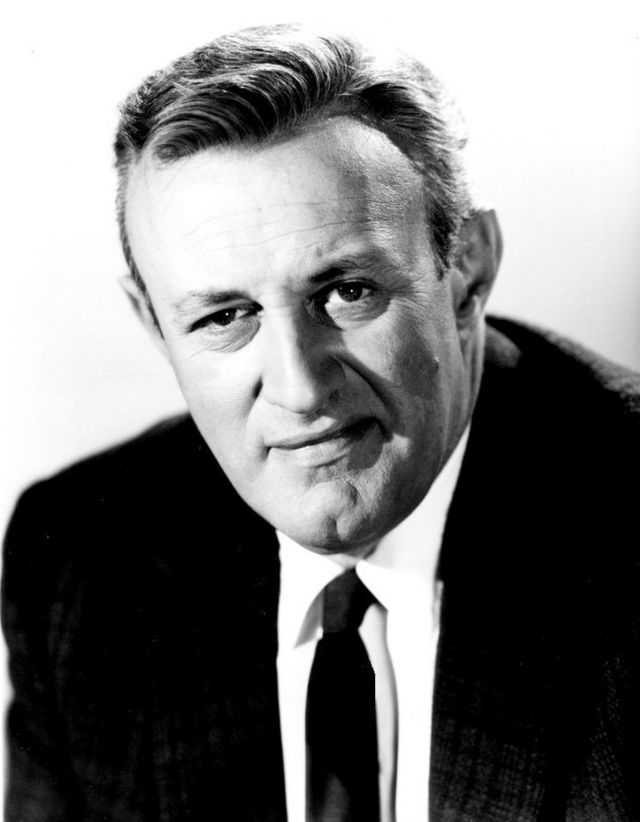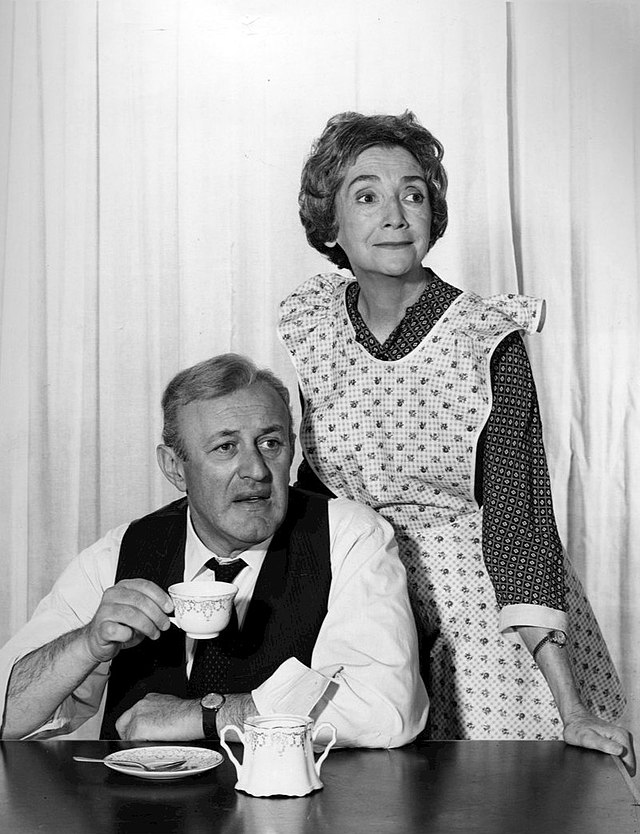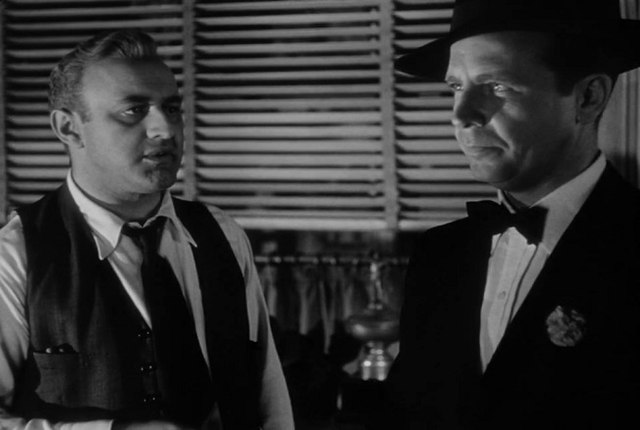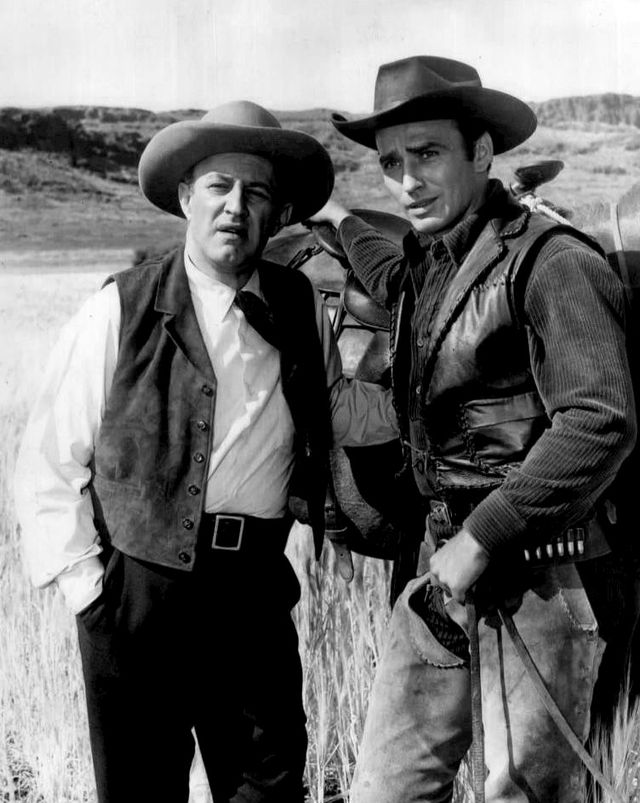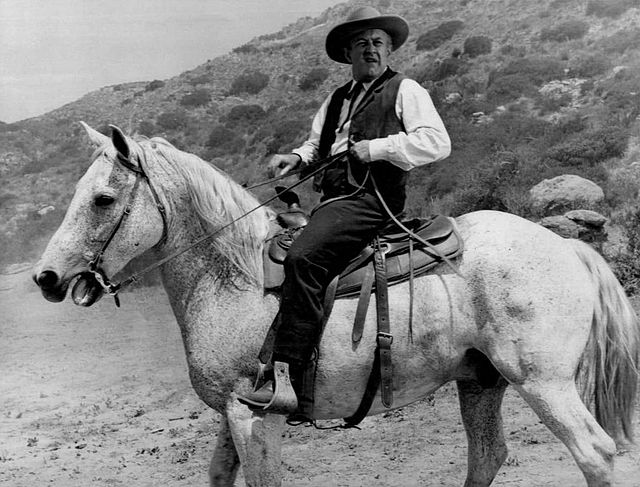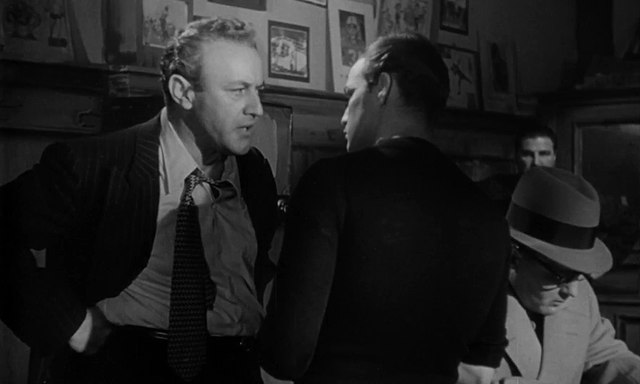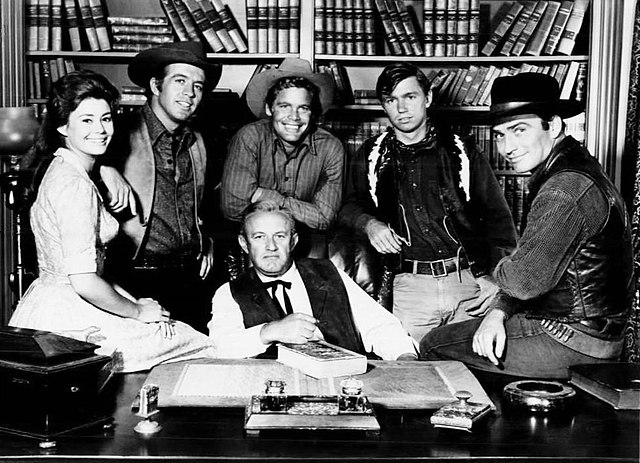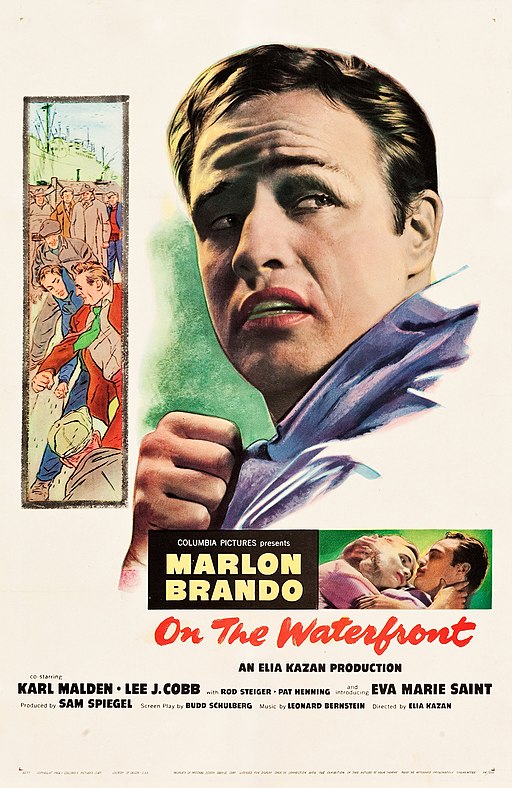Lee J. Cobb
back| Full Name | Leo Jacoby |
| Stage Name | Lee J. Cobb |
| Born | December 8, 1911 |
| Birthplace | New York City, New York, USA |
| Died | February 11, 1976 |
| Buried | Mount Sinai Memorial Park Cemetery, Los Angeles, California, USA |
| Married to | Helen Beverley (1936–1952) - Mary Hirsch (1957–1976) |
| Children | Julie Cobb - Vincent Cobb |
| Notable films | On the Waterfront (1954) - 12 Angry Men (1957) - The Exorcist (1973) - Exodus (1960) - How the West Was Won (1962) - The Brothers Karamazov (1958) |
Lee J. Cobb
Man of a Thousand Faces
Lee J. Cobb was a distinguished American actor known for his commanding presence and emotional intensity. He gained fame with the Group Theatre and transitioned to Hollywood, where his portrayal of Johnny Friendly in On the Waterfront (1954) earned him an Oscar nomination.
Cobb's notable roles include Juror #3 in 12 Angry Men (1957) and Lt. Kinderman in The Exorcist (1973). His performance as Willy Loman in Death of a Salesman (1951) is celebrated for its depth. Despite being blacklisted during the McCarthy era, he continued to deliver powerful performances.
Related
Lee J. Cobb (1911 – 1976)
Biography and Movie Career
Lee J. Cobb was born Leo Jacoby on December 8, 1911, in New York City to a Jewish family. His parents were Benjamin Jacob, a compositor, and Kate Jacob. Cobb developed an interest in acting at a young age and joined the Group Theatre in New York, where he honed his craft.
Cobb's early career was marked by his association with the Group Theatre, where he worked with prominent directors and playwrights like Elia Kazan and Clifford Odets. His performance in plays such as Golden Boy and Waiting for Lefty garnered him critical acclaim.
Cobb transitioned to film in the 1930s, but it wasn't until the 1950s that he became a significant presence in Hollywood. His portrayal of Johnny Friendly in On the Waterfront (1954) was a standout, earning him an Academy Award nomination for Best Supporting Actor.
One of Cobb's most memorable roles was as Juror #3 in 12 Angry Men (1957), where his intense performance as a stubborn and prejudiced juror showcased his acting prowess. He also played significant roles in The Exorcist (1973) as Lt. Kinderman and in The Three Faces of Eve (1957) as Dr. Luther.
Cobb also found success on television. His portrayal of Willy Loman in the 1951 television adaptation of Arthur Miller's Death of a Salesman was highly praised. In the 1960s, he starred in the television series The Virginian, bringing his gravitas to the character of Judge Henry Garth.
Cobb's career was temporarily disrupted during the McCarthy era when he was blacklisted due to his alleged association with communist organizations. Under pressure, he testified before the House Un-American Activities Committee and named names, a decision that haunted him for the rest of his life.
Cobb married actress Helen Beverley in 1936, and they had two children, including actress Julie Cobb. The couple divorced in 1952. He later married Mary Hirsch in 1957, with whom he remained until his death. Cobb's personal life was marked by his dedication to his craft and the complexities of his political choices during the Red Scare.
Lee J. Cobb passed away from a heart attack on February 11, 1976, at the age of 64. He is buried at Mount Sinai Memorial Park Cemetery in Los Angeles, California.
Lee J. Cobb is remembered as one of the most powerful and versatile character actors of his time. His performances in classic films and television series have left a lasting impact on the entertainment industry. Despite the controversy surrounding his testimony during the McCarthy era, Cobb's body of work continues to be celebrated for its intensity and depth.
Short Video Bio of Lee J. Cobb:
Commanding Acting Style:
Lee J. Cobb's acting style is characterized by a commanding presence, deep emotional intensity, and a remarkable ability to convey complex, multifaceted characters. His performances are marked by a profound understanding of human nature, often portraying characters grappling with inner turmoil, moral dilemmas, and societal pressures.
Commanding Presence
Cobb had a powerful screen presence that immediately drew the audience's attention. His robust physicality and authoritative voice lent credibility and weight to his roles. Whether playing a mob boss, a father figure, or a conflicted juror, Cobb's presence was both magnetic and intimidating, often dominating the scenes he was in.
Emotional Intensity
One of Cobb's most striking traits was his emotional intensity. He could convey a wide range of emotions with great depth and authenticity. This intensity was evident in his portrayal of Willy Loman in Death of a Salesman, where he depicted the despair and desperation of a man facing the collapse of his dreams. Similarly, in 12 Angry Men, his portrayal of Juror #3 revealed layers of anger, prejudice, and ultimately vulnerability.
Versatility and Range
Cobb's versatility allowed him to seamlessly transition between different types of characters and genres. He could play both sympathetic and antagonistic roles with equal conviction. In On the Waterfront, he was the ruthless mob boss Johnny Friendly, exuding menace and authority. In contrast, in The Exorcist, he portrayed Lt. Kinderman with a mix of skepticism and compassion, adding a nuanced layer to the horror narrative.
Authenticity and Realism
Cobb's performances were grounded in realism, often drawing from his own life experiences and emotional wellsprings. He had a naturalistic approach to acting, avoiding theatrical exaggeration in favor of subtle, believable portrayals. This authenticity made his characters relatable and their struggles resonate with the audience.
Mastery of Character Complexity
Cobb excelled at portraying characters with inner conflicts and moral ambiguity. His roles often involved individuals facing significant personal challenges or ethical decisions. For instance, in The Brothers Karamazov, he played Fyodor Karamazov, a deeply flawed patriarch whose actions profoundly impact his sons. Cobb's ability to reveal the inner workings of such complex characters added depth and richness to his performances.
Use of Physicality and Voice
Cobb utilized his physicality and voice as integral tools in his acting repertoire. His gestures, posture, and movements were carefully crafted to reflect his characters' personalities and emotional states. His voice, capable of conveying both warmth and menace, was a powerful instrument that he used to great effect, whether delivering a quiet, reflective monologue or a forceful, impassioned speech.
Collaboration and Direction
Cobb's collaborations with notable directors and playwrights, particularly during his time with the Group Theatre, significantly influenced his acting style. Working with figures like Elia Kazan and Clifford Odets helped shape his approach to character development and storytelling. Cobb was known for his dedication to his craft and his willingness to delve deeply into his roles, often immersing himself fully in the character's psyche.
Legacy and Influence
Lee J. Cobb's acting style has left a lasting impact on both audiences and fellow actors. His commitment to authenticity, his ability to portray complex emotions, and his powerful screen presence have made him a respected figure in the world of acting. Cobb's performances continue to be studied and admired for their depth, realism, and emotional resonance.
Why did Lee. J Cobb leave the Television Series “The Virginian”:
Lee J. Cobb left the television series The Virginian after its fourth season, which aired from 1965 to 1966. Cobb played the character Judge Henry Garth, a central figure in the show. His departure from the series was primarily due to health reasons. Cobb's demanding work schedule and the physical toll of working on a Western series contributed to his decision to leave. Additionally, he sought to pursue other opportunities in film and theater, which allowed him more varied roles and the ability to showcase his extensive acting range. Cobb's departure was a significant change for the series, but it allowed him to continue his illustrious career in other projects.
Awards and Recognition:
Academy Awards
- Nominated: Best Actor in a Supporting Role for On the Waterfront (1954)
Primetime Emmy Awards
- Nominated: Best Actor in a Single Performance for Death of a Salesman (1951)
Tony Awards
- Nominated: Best Actor in a Play for Death of a Salesman (1963) - Note: This was for his performance in the 1963 Broadway revival.
Golden Globe Awards
- Nominated: Best Supporting Actor – Motion Picture for The Brothers Karamazov (1958)
Laurel Awards
- Nominated: Top Male Supporting Performance for Exodus (1961)
Other Recognitions
- Venice Film Festival: Volpi Cup for Best Actor for The Brothers Karamazov (1958)
Lee J. Cobb was widely recognized for his powerful performances, particularly in films like On the Waterfront and Death of a Salesman. While his career saw fewer awards than some of his contemporaries, the nominations he received highlight his significant impact on both stage and screen. His performances have left a lasting legacy in the world of acting.
Quotes from Lee J. Cobb:
Quotes from His Roles:
- Juror #3 in 12 Angry Men (1957):
"You come in here with your heart bleeding all over the floor about slum kids and injustice, you listen to some fairy tales, and suddenly you start getting through to some of these old ladies. Well, you're not getting through to me, I've had enough."
- Johnny Friendly in On the Waterfront (1954):
"You take them heaters away from you and you're nothing, you know that? You talk yourself in the unions, you didn't work your way up there like I did. You wanted it handed to you, you think the world owes you a living."
- Willy Loman in Death of a Salesman (1951, TV Movie):
"I am not a dime a dozen! I am Willy Loman, and you are Biff Loman!"
Personal Reflections:
- On his acting philosophy:
"The best part about being an actor is that you never really have to grow up. You're always in a state of becoming."
- On the craft of acting:
"Acting is not about being famous, it's about exploring the human soul."
- Reflecting on his career:
"I've played many roles in my life, but the most challenging one is always the next one."
- On the impact of his work:
"I want my work to be remembered, not for the awards or accolades, but for the truth it brings to the human experience."
Movies Starring Lee J. Cobb:
1930s
- Golden Boy (1939) - Cobb plays Mr. Bonaparte, a father whose son becomes a prizefighter, raising questions about ambition and the cost of success.
1940s
- Men of Boys Town (1941) - Cobb portrays Father Flanagan, who fights for the rights and futures of troubled boys.
- Call Northside 777 (1948) - Cobb is Brian Kelly, a reporter investigating a possible miscarriage of justice.
- The Miracle of the Bells (1948) - He plays Marcus Harris, who helps honor a deceased actress’s dying wish.
- Anna Lucasta (1949) - Cobb stars as Joe Lucasta, dealing with family and moral issues as his daughter returns home.
1950s
- The Man Who Cheated Himself (1950) - Cobb is Lt. Ed Cullen, entangled in a murder cover-up.
- The Family Secret (1951) - He portrays Howard Clark, a father who learns of his son’s crime.
- Death of a Salesman (1951) - TV Movie where Cobb delivers a powerful performance as Willy Loman, a salesman struggling with his personal and professional life.
- The Fighter (1952) - Cobb plays Durango, a manager helping a boxer achieve success.
- The Tall Texan (1953) - Cobb is Ben Trask, part of a group of disparate individuals on a dangerous journey.
- Botany Bay (1953) - Cobb portrays Tom Barrett, a convict on a ship bound for Australia.
- The Three Faces of Eve (1957) - Cobb plays Dr. Curtis Luther, treating a woman with multiple personality disorder.
- 12 Angry Men (1957) - As Juror #3, Cobb is a vehement, stubborn juror convinced of the defendant’s guilt.
- Party Girl (1958) - He plays Rico Angelo, a mob lawyer navigating the criminal underworld.
- The Brothers Karamazov (1958) - Cobb is Fyodor Karamazov, a father whose murder sparks a family crisis.
- Green Mansions (1959) - Cobb portrays Nuflo, a guide in the South American jungle.
1960s
- Exodus (1960) - Cobb is Barak Ben Canaan, a leader in the Jewish struggle for a homeland.
- The Lost World (1960) - He plays Professor Challenger, leading an expedition to a plateau inhabited by prehistoric creatures.
- The Dark at the Top of the Stairs (1960) - Cobb stars as Rubin Flood, facing personal and familial challenges in 1920s Oklahoma.
- How the West Was Won (1962) - Cobb portrays Marshal Lou Ramsey, dealing with the challenges of westward expansion.
- The Four Horsemen of the Apocalypse (1962) - He plays Julio Desnoyers, navigating family loyalties during WWII.
- Come Blow Your Horn (1963) - Cobb is Harry Baker, father to a playboy son.
- Our Man Flint (1966) - Cobb portrays Cramden, the head of Z.O.W.I.E., combating a global threat.
- In Like Flint (1967) - Reprising his role as Cramden in a sequel with further spy adventures.
- Coogan's Bluff (1968) - Cobb plays Lt. McElroy, a police officer dealing with a stubborn Arizona deputy.
1970s
- The Liberation of L.B. Jones (1970) - Cobb is Oman Hedgepath, a small-town lawyer involved in racial tensions.
- The Exorcist (1973) - Cobb portrays Lt. Kinderman, investigating strange occurrences linked to demonic possession.
- Law and Disorder (1974) - He plays Willie, part of a neighborhood watch group facing crime in their community.
- The Great Ice Rip-Off (1974) - TV Movie where Cobb stars in a heist involving a valuable ice sculpture.
Final Appearances
- Moses the Lawgiver (1974) - TV Mini-Series where Cobb appears as Aaron, supporting his brother Moses.
- The Man Who Loved Cat Dancing (1973) - He portrays Harvey Lapchance, a businessman involved in a romantic adventure in the Old West.
- The Great Scout & Cathouse Thursday (1976) - Cobb’s final role as Justice of the Peace in this western comedy.

